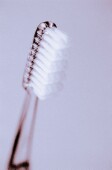- 8 Ways to Increase Dopamine Naturally
- 7 Best Breads for Maintaining Stable Blood Sugar
- Gelatin vs. Collagen: Which is Best for Skin, Nails, and Joints?
- The Long-Term Effects of Daily Turmeric Supplements on Liver Health
- Could Your Grocery Store Meat Be Causing Recurring UTIs?
- Are You Making This Expensive Thermostat Error This Winter?
- Recognizing the Signs of Hypothyroidism
- 10 Strategies to Overcome Insomnia
- Could Artificial Sweeteners Be Aging the Brain Faster?
- Techniques for Soothing Your Nervous System
Sharing a Bathroom With Many Others? Your Toothbrush Likely Has ‘Fecal Matter’

People using communal bathrooms with many others, beware: There could be traces of poop on your toothbrush.
So finds a study by researchers at Quinnipiac University in Hamden, Conn.
The researchers analyzed toothbrushes from Quinnipiac students who used communal bathrooms with an average of more than nine users per bathroom.
Regardless of the students’ toothbrush storage methods, at least 60 percent of the toothbrushes were contaminated with fecal matter, the investigators found.
There was also an 80 percent chance that fecal matter on the toothbrushes came from another person using the bathroom.
The findings were presented this week at the annual meeting of the American Society for Microbiology in New Orleans. The data and conclusions should be viewed as preliminary until published in a peer-reviewed journal.
“The main concern is not with the presence of your own fecal matter on your toothbrush, but rather when a toothbrush is contaminated with fecal matter from someone else, which contains bacteria, viruses or parasites that are not part of your normal flora [microbes],” study author Lauren Aber of Quinnipiac University, said in a society news release.
Her team found no difference in the effectiveness of methods used to clean toothbrushes, such as rinsing with mouthwash, or cold or hot water.
In addition, “using a toothbrush cover doesn’t protect a toothbrush from bacterial growth, but actually creates an environment where bacteria are better suited to grow by keeping the bristles moist and not allowing the head of the toothbrush to dry out between uses,” Aber explained.
“Better hygiene practices are recommended for students who share bathrooms both in the storage of their toothbrush but also in personal hygiene,” she said.
People should follow the American Dental Association recommendations for toothbrush hygiene, Aber suggested. Those recommendations are:
- Do not share toothbrushes
- Rinse the toothbrush with tap water after use and store it upright to allow it to air-dry
- If toothbrushes are in same holder, make sure they are far enough apart to prevent cross-contamination
- Do not use toothbrush covers
- Replace toothbrushes at least once every four months
More information
The American Dental Association offers toothbrush care tips.
Source: HealthDay
Copyright © 2026 HealthDay. All rights reserved.










